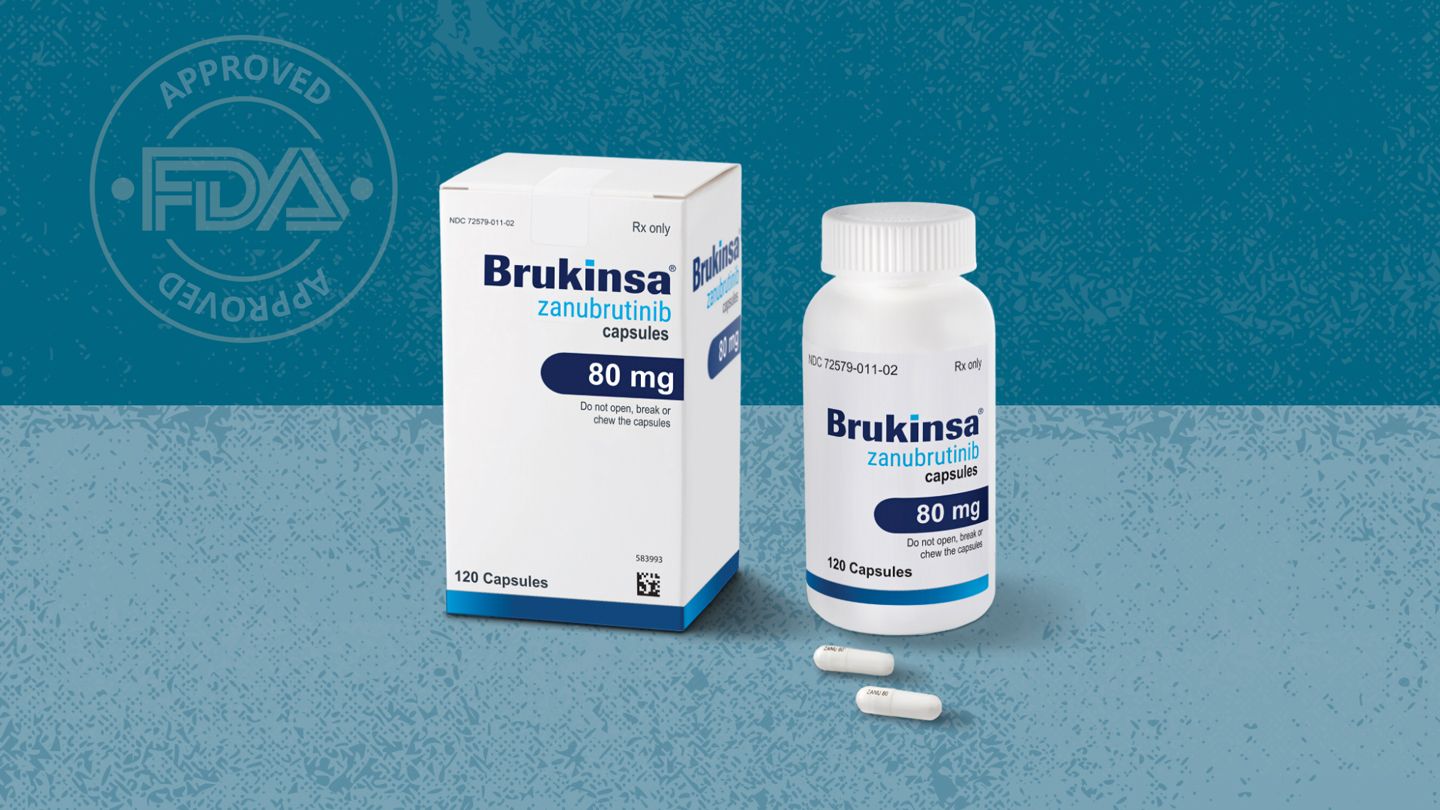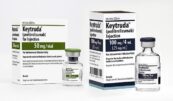Zanubrutinib is approved by FDA for chronic lymphocytic leukemia or small lymphocytic lymphoma
Feb 2023: Zanubrutinib (Brukinsa, BeiGene USA, Inc.) is approved by FDA for chronic lymphocytic leukemia (CLL) or small lymphocytic lymphoma (SLL).
SEQUOIA was used to assess effectiveness in CLL/SLL patients who had not received treatment (NCT03336333). A total of 479 patients were randomized 1:1 to receive either zanubrutinib until disease progression or unacceptable toxicity or bendamustine plus rituximab (BR) for 6 cycles in the randomized cohort that included patients without 17p deletion. Progression-free survival (PFS) was the primary efficacy outcome metric, as established by a separate review committee (IRC). In the zanubrutinib arm, the median PFS was not achieved (95% CI: NE, NE), but in the BR arm, it was 33.7 months (95% CI: 28.1, NE) (HR= 0.42, 95% CI: 0.28, 0.63; p=0.0001). For PFS, the estimated median follow-up was 25.0 months. Zanubrutinib was assessed in 110 patients with previously untreated CLL/SLL with a 17p deletion in a different non-randomized cohort of SEQUOIA. IRC reported an overall response rate (ORR) of 88% (95% CI: 81, 94). After a median follow-up of 25.1 months, the median duration of response (DOR) had not yet been attained.
ALPINE assessed the effectiveness in patients with relapsed or refractory CLL/SLL (NCT03734016). 652 participants in total were randomly assigned to either zanubrutinib or ibrutinib. 1 was the median number of previous lines of treatment (range 1-8). ORR and DOR were the primary efficacy outcome measures at this point in the response analysis, according to an IRC. The ORR for the zanubrutinib arm was 80% (95% CI: 76, 85) and for the ibrutinib arm was 73% (95% CI: 68, 78) (response rate ratio: 1.10, 95% CI: 1.01, 1.20; p=0.0264). After a median follow-up of 14.1 months, neither arm had reached the median DOR.
The most frequent side effects of zanubrutinib (30%) included bleeding (42%), lower respiratory tract infection (39%), decreased platelet count (34%), decreased neutrophil count (42%), and musculoskeletal pain (30%). In 13% of individuals, secondary primary malignancies, such as non-skin carcinomas, occurred. 3.7% of patients had atrial fibrillation or flutter, while 0.2% of patients had ventricular arrhythmias grade 3 or above.
Until the disease progresses or there is intolerable toxicity, the recommended zanubrutinib dosage is 160 mg taken orally twice day or 320 mg taken orally once daily.
View full prescribing information for Brukinsa.
Susan Hau is a distinguished researcher in the field of cancer cell therapy, with a particular focus on T cell-based approaches and cancer vaccines. Her work spans several innovative treatment modalities, including CAR T-cell therapy, TIL (Tumor-Infiltrating Lymphocyte) therapy, and NK (Natural Killer) cell therapy.
Hau's expertise lies in cancer cell biology, where she has made significant contributions to understanding the complex interactions between immune cells and tumors.
Her research aims to enhance the efficacy of immunotherapies by manipulating the tumor microenvironment and exploring novel ways to activate and direct immune responses against cancer cells.
Throughout her career, Hau has collaborated with leading professors and researchers in the field of cancer treatment, both in the United States and China.
These international experiences have broadened her perspective and contributed to her innovative approach to cancer therapy development.
Hau's work is particularly focused on addressing the challenges of treating advanced and metastatic cancers. She has been involved in clinical trials evaluating the safety and efficacy of various immunotherapy approaches, including the promising Gamma Delta T cell therapy.
- Comments Closed
- February 5th, 2023






BeiGene USA, BRUKINSA, chronic lymphocytic leukemia, SEQUOIA, small lymphocytic lymphoma
CancerFax is the most trusted online platform dedicated to connecting individuals facing advanced-stage cancer with groundbreaking cell therapies.
Send your medical reports and get a free analysis.
🌟 Join us in the fight against cancer! 🌟
Привет,
CancerFax — это самая надежная онлайн-платформа, призванная предоставить людям, столкнувшимся с раком на поздних стадиях, доступ к революционным клеточным методам лечения.
Отправьте свои медицинские заключения и получите бесплатный анализ.
🌟 Присоединяйтесь к нам в борьбе с раком! 🌟